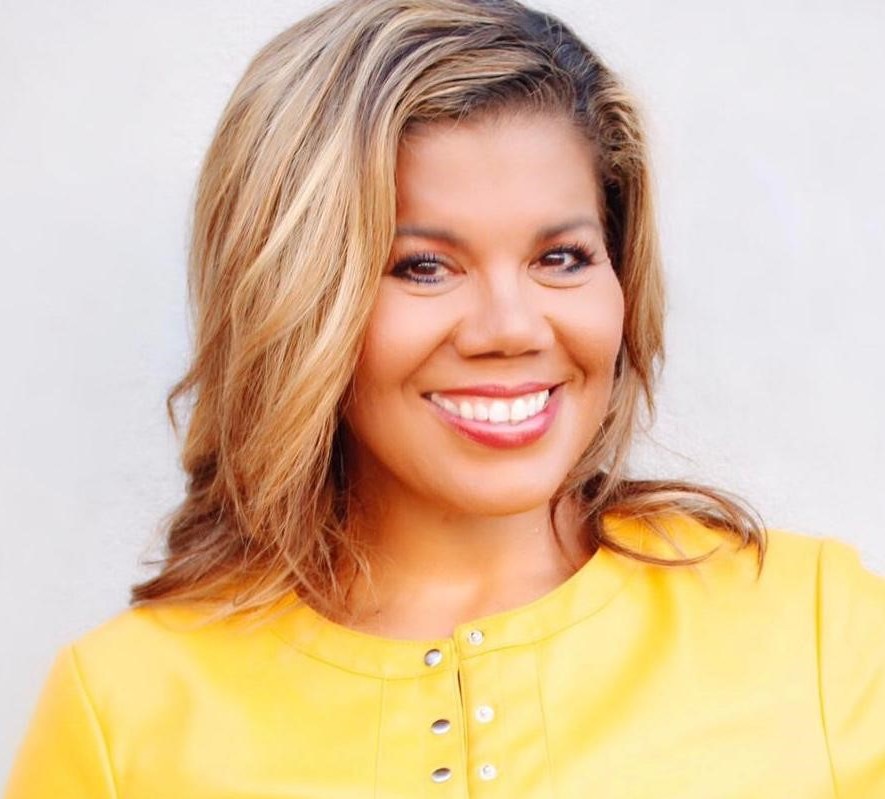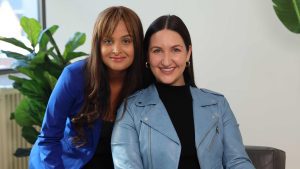[vc_row][vc_column][vc_column_text]Suzanne Duncan has built a career that many would envy. The sports marketing professional has worked across five continents within all levels of play. Her first role out of university? A small, casual event called the Olympic Games.
Needless to say, she’s no stranger to hard work.
“As a biracial child, one of the things talked about—and pretty much any person of color can relate to this—is that I would have to work twice as hard just to be considered equal. And as a woman? Thrice as hard,” says Duncan. “So, excellence wasn’t something that was unusual to me—it was the expectation.”
Given that the sports industry has historically been dominated by men, her ambition and dedication to excellence were key factors leading to her success. And after many roles working for other people, Duncan co-founded her own sports-based experiential marketing agency, Integrated Sports Solutions.
Throughout her career, she has learned many lessons. And Duncan has always made an effort to share them with other up-and-coming women in the industry. So when the opportunity to be a co-founder of The Standard came up, she jumped at the chance.
A premier networking and advocacy group that focuses on elevating, educating, and accelerating Black Canadian women in the marketing industry, The Standard hopes to make impactful change across Canada.
“We created it as a space by us, for us, to foster a strong network of support within our community,” says Duncan. “And we want it to be a collective voice, addressing the realities of the impacts of racism.”
As someone who has spent her career overcoming barriers, she is glad to see that society is talking about topics that were previously swept under the rug. She’s also grateful to be in a position to push these topics forward.
“Like Michelle Obama said, ‘If you get the seat and don’t use it, then don’t bother,’” says Duncan. “My mantra is to get that opportunity and then create it for others.”
For this week’s Women Who Lead spotlight, Bay Street Bull spoke with Suzanne Duncan, Co-Founder of The Standard, about the lessons she’s learned throughout her career, what it means to be “the OBWITR,” and what The Standard has in store.[/vc_column_text][vc_text_separator title=”Q&A” color=”custom” style=”dotted” border_width=”4″ accent_color=”#217c73″][vc_column_text]How did you get involved with co-founding The Standard?
The Standard is the gem of my life! We’re a collective of Canadian women with decades of global experience in the marketing sector. Some of us are entrepreneurs and some of us work for big corporations, so it’s a nice mix. We connected through our shared vantage point of balancing the barriers of gender and race in our personal professional lives. I was actually invited to The Standard through another initiative called the Black Talent Initiative.
The Standard came from this awakening and time where people started to take action and form these groups because the world was sort of reckoning with facing systemic racial inequalities. And from The Standard’s perspective, we saw the need to emphasize an intersectional approach and set a new standard. We really wanted to focus on Black women in marketing and we thought that we were uniquely suited to lead the charge.
We came together once before everything shut down [due to COVID-19] and it was one of the most moving and satisfying experiences that I’ve had professionally to come together and meet women like myself who have taken big strides in their careers and have faced all kinds of obstacles. Together, we were like this powerful entity. Our whole mission is to be Canada’s premier networking and advocacy platform addressing the systemic barriers to advancement for Black women in marketing.
As a Black Canadian woman in sports marketing, which is typically considered a field dominated by men, what is that experience like? Have you faced any obstacles throughout your career to get where you are today? And if so, how did you overcome them?
Absolutely. I recently did a panel by MLSE, NBA, Women In Sports and Events (aka WISE), and The Standard. The segment that I spoke to was called Leveling Up, and it was a conversation of how to break the barriers, especially with the C-suite. There’s an expression called the OWITR, which is the “only woman in the room.” We’ve modified it to the OBWITR, which is the “only Black woman in the room.” And I, from the very beginning of my career, have been the OBWITR the entire time. I’m used to it.
Early in your career, you come in and it’s competitive and you’re supposed to lead, so I did. I was able to move very fluidly between roles. It wasn’t until I got to the senior leadership level that I really saw the inequity. Prior to that, I had intentionally watched the way men maneuvered because when you come into an environment, you watch who’s moving, you see what their tactics are, you follow it. And I had success to that point.
It wasn’t until I got to the mid-management to VP or C-suite roles that I really witnessed the inequities that exist. Part of the greatest challenge, for me, was often other minorities and women in leadership. And the reason that was if there were only two seats at the table and it’s occupied by a minority and a female—or in some cases, there’s only one seat—they are not giving it up. It doesn’t matter what young emerging talent there is. You become competitors instead of lifting each other up or creating more space at the table. So that’s been my greatest challenge. I think it is why a lot of women and minorities start their own businesses. They hit that ceiling and to break it after a long career of hard work and proven excellence becomes really challenging.
We are in a window of time where now we can have a conversation about creating more seats at that table. I’ve always felt very unapologetic about my being where I am. And like Michelle Obama said, “If you get the seat and don’t use it, then don’t bother.” My mantra is to get that opportunity and then create it for others. To answer your question, yes. Many, many obstacles.
How does it feel to be in a position to uplift others through those obstacles that you’ve faced in the past?
It’s everything to me. When you first start your career, it’s just all about you. You don’t realize it, but it is. Then later as you grow, you attach parts that are meaningful to your professional development. And so for me, the meaningful part has been mentorship and support of others. If I can teach you some of what I’ve learned over 10 years of time in five minutes, so you can advance, that’s my legacy. With The Standard, we created it as a space by us, for us, to foster a strong network of support within our community. And we want it to be a collective voice, addressing the realities of the impacts of racism.
Similarly, in my career, I wanted to represent a collective voice of inclusion. I have made it a point to recognize that my legacy is going to be how I’ve encouraged and helped others. That’s the only thing that’s meaningful. And so that’s part of the reason I became a founder and a board member at The Standard.
You touched on this when you said that sometimes it’s actually other females or minorities that end up blocking each other out of high-level positions because a company can then say, “Diversity? Check!” What steps would you like to see companies making towards a real effort to diversify their staff and prevent this from happening?
So much of what we see is performative and it’s disappointing, but the silver lining of performative action means you can have the conversation about it—and before you couldn’t. So, if a brand puts itself out there and says, “Yes. We believe in and support the advancement of all people.” There can now be a conversation when it’s not showing up.
For example, a dear mentor and friend of mine works for a major athletic organization. When he got in there, everyone was patting each other on the back saying they were doing such a good job as an organization. He basically said, “Well, I’m looking out onto the track. And nobody in this room reflects our athletes that are out there.” When he told me, I was so proud of him because that’s the kind of lens and intentionality that organizations need. I think what organizations can do is admit where they have not lived up to it and then begin changing it. The intention is important and so is tying money to it, because equity and inclusion will not change unless it’s a part of the business imperative.
It does require a certain amount of fearlessness, because being intentional means showing up differently. It means challenging people in that conversation—and I do that. But part of the reason I can do that is because I’ve had this career that I’ve earned and I’ve gotten to a point where I’m unafraid. Whereas other people are new in their career and they don’t want to rock the boat. They’re happy just to be there. I think it takes courage and boldness of people to speak up. And now is the time, it’s a climate where you can. So now, to me, the ownership is on every single person in the room to create more space at that table for everyone else.
I think it’s a great point how even performative action can have advancements, because as you’ve said, now those people can be held accountable for what they’ve said that they’re going to do. So it opens that door to be like, “Hey, you said you were going to do X, Y, and Z, but you’ve done none of them.”
Exactly. It drives accountability. We’ve seen brands put out statements and then the internal employees come out and said, “No, actually, we don’t do that.” And I think that that’s positive. Because, again, it drives accountability.
RELATED: 15 Organizations Cultivating Black Talent in Canada
Throughout your long career, was there any piece of advice along the way that really helped you to power through and get where you are today?
I had a retired Army Colonel, Wayne Stacey, whom I worked for early in my career. He told me to be led by my values and to not be flexible with those under any circumstances as a professional. He said I would see many [people] along the way who would alter their positions in order to gain an advantage but that would compromise one’s integrity. As a result, I have never put my own aspirations, above pointing out what’s fair and what’s not, what’s honest and what’s dishonest in any organization I have contributed to.
I am a bridge-builder and a truth-keeper. I would never use other people’s heads as stepping stones to gain an advantage, nor compromise what I believe in for a greater position. As such, I understand this: my ascent may be slower, but my integrity will be intact. I live by this and sometimes, professionally, I have paid a price towards advancement, but I stand by it and value that about my character the most.
Along similar lines, is there anything that you would tell your younger self that you know now and you wish you knew back then?
All paths lead to where you’re meant to go. You get in your head, particularly when you’re younger, that a certain path is going to get you exactly where you want to go. When you chart that path, you don’t want to divert from it because you think that’s going to take you someplace different, but all paths lead you to where you’re meant to go. For me, I can see now how all of the fibers connected and wove like a DNA strand into where I’m meant to be. At the time, I was like, “Oh, no, this is off course.” And what I would say to my younger self is that time is well spent experimenting because it will all weave back to the place that you’re meant to be.
You touched on it by saying that you loved how you were able to meet everyone from The Standard in person before the COVID-19 lockdown hit. Did you want to build on that experience of being able to meet the other co-founders?
Our first event was an introduction to the community. It was proof of concept if you will because there were these women from all over Canada coming together. Our goal is to have a reach all over Canada and come together to share stories and experiences within a network that is safe. If you were wondering if the concept [of The Standard] was needed, each of the stories that the community shared that day showed you that you weren’t in isolation with what you think no one else faces professionally. And that to me is valuable.
We’re not in it for the short term, there’s going to be a lot of organizations that came about in this time that aren’t sustainable, and will not be there in the end. But that’s not what The Standard is. I believe that our unique story of 14 women with different colours, shades, and backgrounds coming together for a single mission will still be standing when all the dust clears and things move on.[/vc_column_text][vc_separator color=”custom” accent_color=”#217c73″][vc_column_text][yikes-mailchimp form=”1″ title=”1″ submit=”SUBSCRIBE”][/vc_column_text][/vc_column][/vc_row]








